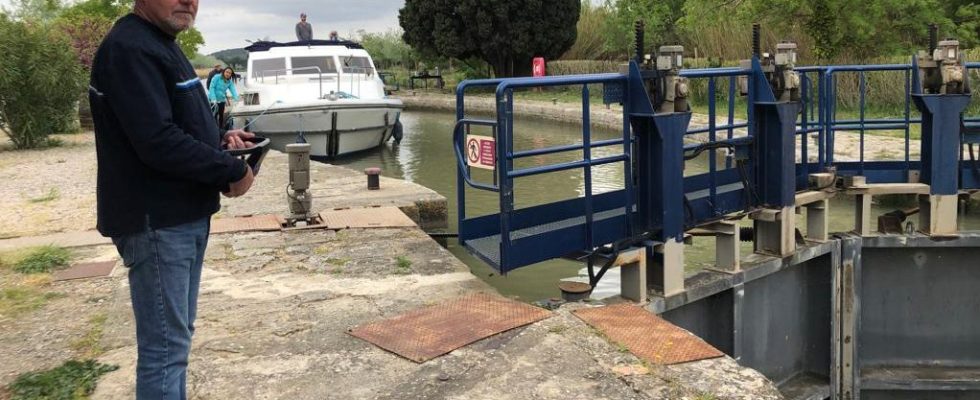“We will have to wait. Twenty minutes”. Minimum. It’s almost 11:30 a.m. on the canal du midi. Eva, an American who came from Washington with her husband, 18-month-old son and in-laws ends her week-long cruise on green waters and approaches the lock of Argens-Minervois, in the Aude, the last before Béziers and the sea, 53 kilometers “lower”. There is no other boat on the horizon, no barge behind them. This Friday morning is calm, before the wave of Easter holidays for Parisians and Toulouse residents. However, Johnny Brinkmans, the lock keeper, asks them to be patient. He scrupulously applies instructions, unprecedented at the start of the tourist season. That of favoring the “grouped passage”, even if it means making the crews splash a little. Its lock basin contains 500 m3 of water. Irretrievably lost towards the bay each time he opens the leaves to let a boat pass. And now is not the time to waste.
After an unprecedented winter drought, Waterways of France (VNF), the canal manager, is forced to juggle early on with “the different uses of water”. It must not only guarantee a sufficient flow to holidaymakers, it must also ensure that its Cammazes reservoir, in the Montagne Noire, is well supplied to supply certain municipalities with drinking water and guarantee the farmers of Lauragais that they will be able to properly irrigate their crops. The grouped passage of the locks has already been tested last season, but only for the summer. This time, VNF, which has already delayed the opening to navigation by three weeks, to let the drained reaches fill up naturally rather than soliciting the dams whose levels are abnormally low, is anticipating.
Four boats at once, Tetris style
” I totally understand. We have to save water,” agrees Eva. She has had a worse avatar than a short break. The day before, a mower on the banks propelled a pebble and broke a window of the boat now replaced by a pizza box. Moreover, for American tourists, the 20 regulatory minutes last less. Even if the channel has no traffic sensors, he knows from his colleague, 8 km upstream, that no boat is a priori engaged in the reach. No need to prolong the pleasure for nothing. “I always give priority to the descent, and sometimes it can last an hour”, explains the lock keeper who finds that tourists “generally take well” to the setback, except for a few retired people in a hurry. “If we start talking, we will always find a good excuse to get a boat to pass. A restaurant reserved on the road, for example”, says the man who, with his 20 years in the business, knows how to be flexible but firm and uses the brochure translated into three languages - “Let’s group the boats together to save water” – in case of misunderstanding.
By consulting his roadmap in his office, the professional realizes the effectiveness of the measure in this preseason: “on April 7, I had 42 boats and I only emptied 13 times”. Same thing on April 9 for 48 boats. And, this Friday afternoon, after the passage of the Americans alone, the canal having “filled up”, he managed to squeeze in, Tetris style, four boats at once in his small basin.
“If there is no more water, there are no more holidays”
Less than two kilometers from the Argens lock, in the eponymous village, boat rental companies also testify to the indulgence of holidaymakers for extended stopovers. “We put the brochure on the front page of their navigation book and explains to them that the lock keepers can have to wait for several boats and that doesn’t bother them at all”, confides Karen, hostess at Locaboat. The cause of water, cross-border, seems to convey indulgence. “More than when it’s a strike that delays the opening of the locks in any case,” she notes. “Clients understand, of course. If there’s no more water, there’s no more vacation,” confirms Sarah from Hapimag, the counter next door. This prospect, of a possible closing of the canal, for lack of draft, haunts, for the first time, all the professionals.

